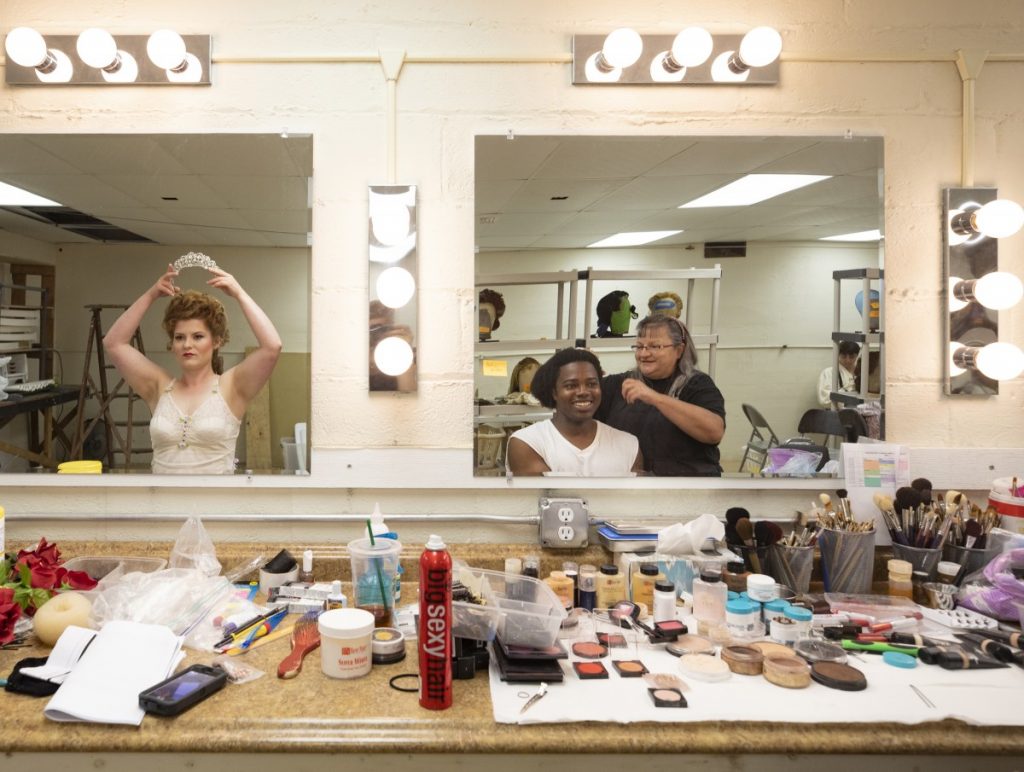
In preparation for Chautauqua Opera’s Behind-the-Scenes series, General and Artistic Director Steven Osgood asked the stage management team what kind of questions people usually ask them about their job. Emily Barber had to laugh.
“Most people don’t even know what a stage manager does,” she said. “People don’t usually ask (anything), because they don’t even know where to start.”
Barber is the production stage manager for the New Orleans Opera and one of Chautauqua Opera’s calling stage managers. She will be appearing with fellow stage managers Valerie Wheeler, Kendra Green, Adam Fulmer and Emilia Covault at noon EDT Thursday, July 23, on the CHQ Assembly Virtual Porch for Chautauqua Opera Behind-the-Scenes: Stage Management.
The team will talk with Osgood about their work during a typical Opera season, share stories and answer audience questions.
Stage managers are involved in the production of an opera at Chautauqua from beginning to end. During a typical season, the team arrives at the Institution before the director and artists to prepare music, gather props, measure out the stage for blocking and make sure everything is ready when they arrive.
“That way we can jump straight into rehearsals,” Barber said. “Once we’re in rehearsals, it’s our job to help and maintain the artistic vision of the director, and to make sure that everyone’s following union guidelines, that everyone’s feeling comfortable and safe. We just (generally) take care of the production.”
Stage managers serve as liaisons between the Opera’s many departments. Part of their job is to update and distribute production paperwork that lets the different crews know when their various tasks, from lighting cues to costume changes, need to happen during a performance.
“(We’re) with the production throughout rehearsals and throughout the actual run of the show, whereas a crew member is not,” Barber said. “Someone who’s operating the fly system, which brings the curtain in and out, (has) essentially never seen the show before, they don’t know what’s going on. (With paperwork) we can say, ‘Sixty-three minutes and 30 seconds into Act One, that’s about the time when you call in the fly system.’”
During the run of an opera, stage managers sit backstage in the wings, or sides, of the stage. They’re connected with crew members across departments through headsets, and are in charge of cueing, or calling, every aspect of a show.
“You are where the buck stops,” Barber said. “Basically, once we get into performance, the director has no control, the conductor only has enough (power) to control the orchestra, but the stage manager controls everything else.”
Due to the unpredictable nature of live theater, a stage manager has to be ready to improvise at a moment’s notice.
“(Things go wrong) every day, you have so many different components,” said Wheeler, Chautauqua Opera’s production, or head, stage manager. “It’s our job to make sure whatever’s going on behind the scenes doesn’t get transmitted to the audience, so that they don’t know that there’s anything going wrong.”
Wheeler has experienced everything from power outages, to performer injuries to misplaced props.
“Imagine you’re putting on (Mozart’s) The Magic Flute, and the performer holding the magic flute forgets the magic flute in the bathroom,” she said. “Stuff like that happens.”
Although stage managers are often the unsung heroes of a production, Wheeler said she and the rest of Chautauqua Opera’s team wouldn’t be in this line of work if they were looking for the spotlight.
“We kind of like being the people dressed in black and hiding backstage with a headset on,” she said. “I hope audience members understand, I love being a support person. … I get to see a performance every night, I get to see these people work their machines and work their talent. We’re a team, we’re a family, and when it comes together it’s great, and that’s what I look forward to.”




